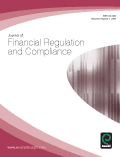
Journal of Financial Regulation and Compliance
Scope & Guideline
Bridging Theory and Practice in Financial Compliance
Introduction
Aims and Scopes
- Regulatory Compliance and Governance:
The journal emphasizes research on compliance frameworks and governance structures within financial institutions, exploring how these elements affect organizational performance and risk management. - Impact of Regulation on Financial Stability:
There is a core focus on evaluating how different regulatory measures influence the stability and resilience of financial systems, particularly in the context of crises and market fluctuations. - Financial Inclusion and Technology:
The journal covers emerging themes related to financial inclusion, particularly the role of technology (FinTech) in enhancing access to financial services for underserved populations. - Risk Management Practices:
Research addressing risk governance, risk management frameworks, and their effectiveness in mitigating financial risks in banking and finance is a significant area of interest. - Comparative Studies across Regions:
The journal promotes comparative analyses of financial regulation and compliance practices across different geographical regions, offering insights into how local contexts shape financial outcomes. - Behavioral Finance and Investor Behavior:
The exploration of investor behavior, especially in relation to regulatory changes and market dynamics, is a recurring theme, providing insights into decision-making processes in finance.
Trending and Emerging
- Digital Finance and Cryptocurrencies:
There is a growing emphasis on the regulation of digital currencies, including central bank digital currencies (CBDCs) and stablecoins, reflecting the urgent need for frameworks that address these rapidly evolving assets. - Behavioral Insights in Finance:
Research examining the psychological factors influencing investor behavior and decision-making processes is on the rise, as scholars seek to understand the implications of behavioral finance in regulatory contexts. - Impact of Technology on Compliance:
The integration of technology in compliance practices, including regulatory technology (RegTech) and supervisory technology (SupTech), is emerging as a critical area of study, focusing on innovations that enhance regulatory effectiveness. - Global Regulatory Comparisons:
Comparative studies analyzing the effectiveness of financial regulations across different regions are trending, highlighting the need for global cooperation and standardized practices in financial regulation. - Sustainable Finance and ESG Considerations:
There is an increasing focus on environmental, social, and governance (ESG) factors in financial regulation, reflecting a broader societal demand for sustainable and responsible investment practices.
Declining or Waning
- Traditional Banking Models:
Research centered on traditional banking models and their regulatory environments is becoming less frequent, possibly due to the rise of digital and decentralized financial systems. - Outdated Regulatory Frameworks:
There is a noticeable decrease in studies focusing on older regulatory frameworks, as the field shifts towards examining contemporary issues like cryptocurrency regulation and digital finance. - Sector-Specific Regulations:
Studies that concentrate solely on sector-specific regulations without considering broader financial ecosystem impacts are waning, indicating a move towards more integrated analyses. - Static Risk Assessments:
The journal has shown a decline in papers that present static assessments of financial risks without incorporating dynamic elements, such as behavioral factors or market volatility. - Historical Analysis of Financial Crises:
Research focused on historical analyses of past financial crises without actionable insights for current regulatory practices is becoming less prevalent, as the emphasis shifts to forward-looking frameworks.
Similar Journals

Journal of Money Laundering Control
Advancing the Fight Against Financial CrimeJournal of Money Laundering Control, published by Emerald Group Publishing Ltd, has established itself as a crucial resource in the fields of economics, law, and public administration since its inception in 1997. With a broad scope that encompasses the investigation and mitigation of financial crime, this journal is dedicated to advancing knowledge and facilitating dialogue among researchers, practitioners, and policymakers aiming to combat money laundering and enhance compliance frameworks. The journal boasts a commendable ranking in Scopus, featuring a Q2 category placement in both Economics, Econometrics, and Finance as well as Law, and a Q3 ranking in Public Administration for 2023. With an ISSN of 1758-7808 and an E-ISSN of 1368-5201, the journal facilitates access to high-quality peer-reviewed articles, fostering an environment of scholarly discussion that is vital for the ongoing development of effective financial governance. Researchers and students alike will find invaluable insights and cutting-edge studies that not only highlight crucial trends in compliance and regulatory practices but also propose innovative solutions for the persistent challenges in money laundering control.
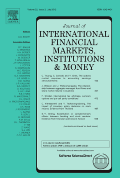
Journal of International Financial Markets Institutions & Money
Innovating Research in International FinanceThe Journal of International Financial Markets, Institutions & Money, published by Elsevier, serves as a leading platform for the dissemination of high-quality research in the fields of finance, economics, and econometrics. With an impressive impact factor reflected in its status as a Q1 journal in both categories for 2023, it ranks among the top journals, positioned at #47 out of 317 in Finance and #111 out of 716 in Economics. This journal offers a unique focus on the interplay between financial markets and institutions on a global scale, making it an essential resource for scholars, practitioners, and students alike. The journal welcomes innovative theoretical, empirical, and applied research, contributing to an exciting dialogue that shapes the future of international finance. For researchers looking to publish their findings, this journal is committed to rigorously engaging with contemporary financial phenomena, positioning itself as a vital cornerstone of academic and professional discourse.
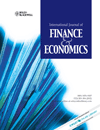
INTERNATIONAL JOURNAL OF FINANCE & ECONOMICS
Illuminating Pathways in Accounting and EconomicsInternational Journal of Finance & Economics, published by Wiley, is a premier academic journal that serves as a vital resource for researchers and professionals in the fields of finance, accounting, and economics. With an impressive impact factor and a reputation for excellence, the journal is recognized in the 2023 Scopus rankings, placing in the top quartiles across multiple categories, including Q2 in Accounting, Economics, and Finance. The journal has been a significant contributor to academic discourse since its inception in 1996, with its converged years extending to 2024, thereby ensuring the continuous advancement of knowledge in these critical areas. Although it operates under a traditional subscription model, its comprehensive articles provide insightful analyses, empirical research, and theoretical advancements that cater to a diverse audience—from seasoned scholars to emerging students in the field.
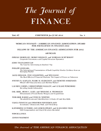
JOURNAL OF FINANCE
Advancing financial knowledge since 1946.JOURNAL OF FINANCE, published by Wiley, stands as a premier academic journal in the fields of finance, economics, and accounting. With a history dating back to 1946, the journal has consistently delivered impactful research that shapes financial theory and practice, boasting an impressive impact factor reflective of its high citation rate. Its Quartile 1 ranking in Accounting, Economics and Econometrics, and Finance illustrates its leading position within these disciplines. Although not an open access publication, the journal continues to be indispensable for researchers, professionals, and students seeking to advance their understanding and knowledge through rigorous empirical analysis and comprehensive reviews. With an esteemed global readership, the JOURNAL OF FINANCE remains committed to fostering the dissemination of innovative financial research well into 2024 and beyond.
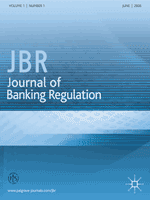
Journal of Banking Regulation
Decoding Complexities in Banking Regulations.Journal of Banking Regulation is a premier academic journal published by Palgrave Macmillan Ltd. based in the United Kingdom, contributing significantly to the fields of Economics and Finance. With an ISSN of 1745-6452 and an E-ISSN of 1750-2071, this journal serves as a vital platform for the dissemination of cutting-edge research that addresses the complexities of banking regulations in a rapidly evolving financial landscape. As a Q3 ranked journal in both Economics and Econometrics and Finance categories, it holds a respectable position among its peers, with Scopus ranks highlighting its impact within the research community (Rank #246/716 and #115/317, respectively). The journal has been converging contemporary studies and analyses since its inception in 2008, and actively invites scholars, professionals, and students to explore its insightful articles. Though primarily subscription-based, readers can benefit from its rigorous content, which aims to inform regulatory practices and foster a deeper understanding of the banking sector's intersection with global economic trends.
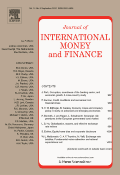
JOURNAL OF INTERNATIONAL MONEY AND FINANCE
Elevating discourse in finance and economic policy.JOURNAL OF INTERNATIONAL MONEY AND FINANCE is a premier scholarly publication dedicated to advancing the understanding of international finance and monetary economics. Published by Elsevier Science Ltd, this esteemed journal has been disseminating critical research since its inception in 1982 and will continue to contribute to the field through 2024. With a strong international presence and headquarters in the United Kingdom, the journal boasts an impressive collection of articles that explore significant trends, challenges, and innovations in the areas of economics and finance. Recognized for its impact, it ranks in the top quartile (Q1) in both the Economics and Econometrics and Finance categories as of 2023, signifying its influence and relevance among peers. Researchers, professionals, and students in these disciplines can benefit from the journal's rigorous peer-review process, ensuring high-quality scholarly outputs. Though not currently an open-access journal, it provides various subscription options to foster access to groundbreaking research in the financial ecosystem.
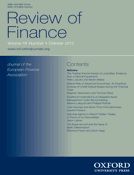
Review of Finance
Pioneering high-quality research in finance and beyond.The Review of Finance, published by Oxford University Press, stands as a premier academic journal in the fields of Finance, Accounting, and Economics. With an ISSN of 1572-3097 and an impressive track record stretching from 2001 to 2024, this journal is consistently recognized for its high-quality research, reflected in its Q1 rankings across key categories, including Accounting, Finance, and Economics and Econometrics. The Review of Finance is dedicated to advancing the understanding of financial phenomena through robust empirical and theoretical insights, making it an essential resource for researchers and professionals alike. Additionally, its strong Scopus rankings, placing it in the top percentiles, highlight its influence and relevance in ongoing academic discourse. Although the journal is not open access, it remains widely accessible through academic institutions, ensuring that its valuable contributions reach an extensive audience. The editorial board invites submissions that promise to further engage the academic community in the dynamic intersections of finance, accounting, and economic research.

International Review of Finance
Empowering economists and financiers with cutting-edge insights.International Review of Finance is a prestigious academic journal published by Wiley, located in the United Kingdom. With its ISSN 1369-412X and E-ISSN 1468-2443, this journal serves as an essential platform for researchers and practitioners in the fields of Economics and Finance. Ranked in the Q2 quartile for both Economics and Econometrics and Finance as of 2023, it showcases high-quality research that contributes significantly to theoretical and practical advancements. Reflecting its standing, the journal is positioned in the 61st percentile in Economics and Econometrics and the 60th percentile in Finance according to Scopus rankings. The scope of the journal includes a diverse range of topics, encouraging innovative discourse across various financial disciplines. Although it does not offer open access, the International Review of Finance continues to be an important resource for academics, professionals, and students seeking to deepen their understanding of evolving financial theories and practices.
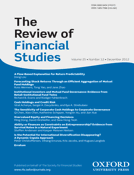
REVIEW OF FINANCIAL STUDIES
Connecting Academia and Practice in FinanceREVIEW OF FINANCIAL STUDIES, published by Oxford University Press Inc, stands as a premier academic journal in the realms of accounting, economics, and finance. With an impressive Impact Factor that reflects its high citation rates and broad influence, this journal, with an ISSN of 0893-9454 and E-ISSN 1465-7368, is considered a cornerstone for researchers, academics, and professionals seeking to contribute to and stay updated on groundbreaking developments in financial studies. Since its inception in 1996, it has established a robust reputation, consistently ranking in the Q1 category across multiple disciplines, highlighting its elite status in the global academic landscape. The Scopus rankings further reinforce its importance, positioning it at the forefront of business, economics, and finance research. While the journal is not open access, it offers vital insights and comprehensive studies that foster a deeper understanding of contemporary financial issues and methodologies. Located in the United Kingdom, the REVIEW OF FINANCIAL STUDIES is an essential resource for those aiming to advance their knowledge and research in this dynamic field.
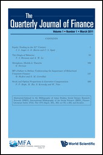
Quarterly Journal of Finance
Innovating Strategies, Shaping Financial FuturesThe Quarterly Journal of Finance, published by World Scientific Publishing Co. Pte Ltd, serves as a vital resource for the global academic community in the fields of Finance, Economics, and Strategy and Management. With an ISSN of 2010-1392 and E-ISSN 2010-1406, this journal boasts a respectable impact factor reflective of its standing, being ranked in the Q2 quartile across multiple categories in 2023. The journal's diverse scope includes innovative research and critical reviews that address current issues in financial practices and economic strategies, making it a pertinent platform for scholars and industry professionals alike. Despite its lack of open access, the journal's rigorous selection process ensures the publication of high-quality, impactful research. The Quarterly Journal of Finance is particularly distinguished for its commitment to advancing knowledge and fostering dialogues within its converging fields, proving to be an indispensable asset for researchers, professionals, and students eager to stay abreast of developments from 2011 to 2024 and beyond.